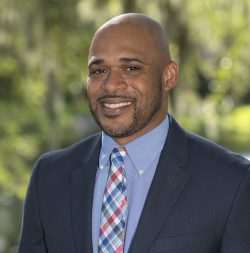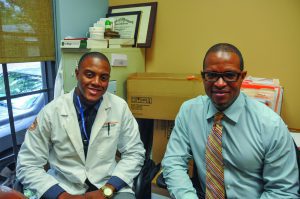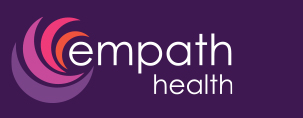
Empath Health Community Partnership Specialist LaShante Keys
June is Men’s Health Month – a time to pledge to support better health and wellness for men.
Many men, older and younger, are at risk or impacted by serious health issues, but might not address them. With education, preventative care and lifestyle changes, men can become healthier, live longer and be around for their families.
A Focus on African American Men
Empath Health will host an African American Men’s Health Forum on Saturday, June 30 from 10 a.m. to 2 p.m. at our Clearwater Service Center, 5771 Roosevelt Blvd. WTSP Channel 10 Reporter Garin Flowers will serve as the panel moderator.
This free event will bring African American men and youth together to learn about healthy living.
“I think this is much needed for our community as African American men have been labeled as not caring about their health. This forum will be a great opportunity for males ages 14 and older to address this stigma and obtain resources on how to deal with the stresses that come with health issues. We want to give the younger generation the foundation to not be afraid to ask questions about their health,” said LaShante Keys, Empath Health community partnership specialist.
Activities will include:
• Entertainment
• Panel, discussions and youth and adult break-out sessions on various topics (medical, faith, healthy eating, skin care, prostate cancer, body maintenance, advance care planning, sexual health and mental health)
• Lunch presentation
• Voter registration
• Stress relief activities (aromatherapy, yoga, music therapy)
• Health screenings

Daiquaun Harrison and Charlie Colquitt, PharmD at work at Johnnie Ruth Clarke community health center.
Educating Youth
Education is key for younger populations who might not link certain behaviors as unhealthy, explained Daiquaun Harrison. He is a Florida A&M University (FAMU) pharmacy student assisting with a diabetes management project led by Charlie Colquitt, PharmD, a clinical pharmacist at Community Health Centers of Pinellas at Johnnie Ruth Clarke campus and a FAMU associate professor of pharmacy practice.
Harrison shared, “My perception is that a lot of health disparities start to occur younger on. We feel that we are in good shape, but we are actually causing a lot of damage to our bodies with drinking, eating fast food and inactivity. A lot of us are suffering because of technology. We don’t feel like we need to go to the doctor because we aren’t experiencing any symptoms. Then there’s a lack of education. A lot of my friends say that they are in shape but they are still eating fried food. They don’t feel it now, but they are clogging up their arteries.”
Health Care and Lifestyle
Getting regular check-ups, screenings and tests is critical for men, Colquitt said.
“We’re hard-headed. We don’t want to take time off from work to see a doctor. We need tough love. Go see your doctor. Prostate cancer is something that will kill you if you don’t get it checked. Get a digital rectal exam. It’s very important to have a stool test to check for colon cancer.”
A healthy diet is another important step toward improved health.
Colquitt explained, “African American men typically have a high salt diet. Try to choose fresh vegetables and meats and cook your meals, so you can control the amount of salt and seasoning. Learning how to read a label and understanding serving sizes open up a lot of people’s eyes. If you like fried food, just don’t eat it as much. Eat different vegetables and minimize starches and sugar intake.”
Exercise also makes a healthy difference.
“Start somewhere. Walk around the block. First do ten minutes and gradually work up to 30 minutes three to four times a week. Those simple things can make a dramatic impact,” he said.
Register Now!
We hope to see you at our African American Men’s Health Forum on Saturday, June 30 at Empath Health in Clearwater. Register by Friday, June 22 at EmpathHealth.org/MensHealth.

Recent Comments